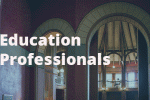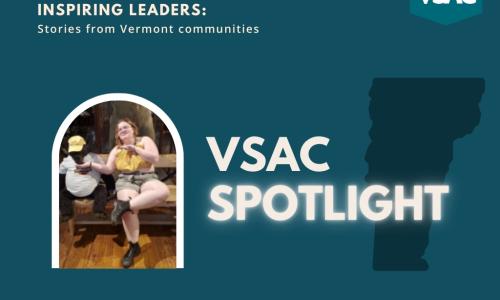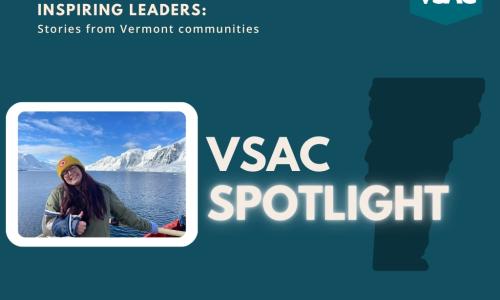Planning for college or training this year? Apply for the Vermont Grant.
Will Eberle’s Trajectory Was Changed by VSAC’s Educational Opportunity Center

Almost exactly four years ago, VSAC first reported on Will Eberle, who overcame homelessness and addiction and went from high-school dropout to master’s-degree student, through equal parts personal determination and community support.
But Eberle is quick to say that his success is no Horatio Alger story. Rather than a testament to the power of hard work, Eberle believes his story is proof of the need for communities to invest in people who need help.
Now, as the recently appointed executive director of VAMHAR – the Vermont Association for Mental Health and Addiction Recovery – Eberle hopes his lived experience of poverty, homelessness, mental health challenges, and addiction will inspire other individuals who are just beginning their own recovery marathons, as well as inform organizations that are starting their own endurance races toward greater equity and inclusion.
“It’s easy to embrace the bootstraps analogy, but it’s almost never true,” he explains.
“Sure, I had drive and motivation,” recalls Eberle, who was homeless for a time – living out of his truck – while he worked odd jobs washing dishes, fighting fires, and working construction in order to afford secure housing and complete his first semester of college. But after those first few months, he didn’t have the funds to move forward. “It wasn’t enough to just want those things. I needed real opportunities to get to the next place.”
He credits a scholarship from VSAC’s Educational Opportunity Center with changing the trajectory of his life.
“Each opportunity was built on previous opportunities, and VSAC was foundational to that,” he says.
Before he could do anything else, he had to go from someone who had dropped out of high school to someone with a college degree. While the five-year journey wasn’t easy – “it took me a lot longer than those who follow the traditional path,” he says – that college degree allowed him to move out of construction, where he was plagued by injuries, and into a job as a field director with Vermont’s Agency of Human Services, where he could focus on issues he cared deeply about: hunger, access to mental health care, and the opiate crisis.
From there, he was able to go on to earn a Master of Public Administration from Norwich University, and he was also selected for the Vermont Leadership Institute at the Snelling Center for Government.
“And all that started with someone who said, ‘We see a lot of difficult and hard experiences in your past. Maybe at this moment you wouldn’t look like the ideal candidate on paper, but we’re going to give you a chance,’” he says.
“Unfortunately, it’s still common for people to believe that those who are struggling with mental health issues, addiction, or homelessness made a series of choices that landed them in their situation. They wonder why those individuals can’t simply stop abusing substances, or ‘snap out of it,’ or get a job,” Eberle says.
“It is possible for everyone to recover. At the same time, it only becomes probable when the community gives them real support and real resources,” starting with reducing stigma.
“We haven’t yet attained a place in our culture where it’s fully acceptable to talk about needing help. Period. It doesn’t matter if the help needed is mental, physical, addiction-related or economic. There needs to be more of a normalization,” he says, and people who are struggling need to know that “they’re not the first ones to go down this road. Because recovery takes a lot of endurance.”
In fact, the opportunity to serve as that type of role model was one of the reasons Eberle was drawn to working at VAMHAR. “I wanted to connect my lived experience with the work in a visible way. It’s very helpful to do that in the world of recovery because it’s such a powerful mode of connection.”
At the same time, Eberle says, if we as a society want to overcome addiction, we need to do more than celebrate the wins.
“I’m happy to be a representative of this community, but I’m also not a representative experience,” he says. “Once again, it’s easy to focus on the success stories. But in general, it’s not enough to give a handful of people a little bit of opportunity. There also has to be a place for people with those experiences to shape what policies look like and how money is spent.”
Eberle wants to help drive that change, both through his work at VAMHAR and through a side gig he just launched, a consultancy called Mission Driver. “The goal is to help organizations let go of the idea that there should be a command-and-control executive,” he says of his consulting work.
Within his first two months at VAMHAR, Eberle led the shift to a collaborative leadership structure among the organization’s five full-time staff. “We collectively make decisions about key initiatives, budgets, really every aspect of the organization,” he says. He credits a visionary board and an enthusiastic team for making that happen. “Everyone was up to the challenge of stretching to do things in new ways,” Eberle says.
Collective leadership, he says, is a strong enabler of elevating the voices of those who have traditionally worked in the background – whether that’s people of color, people who grew up in poverty, or people who have faced trauma and mental health challenges.
According to Eberle, “When people need help, we as a community should give them support, but we should also give them an opportunity to give back through leadership. It’s a way of saying, ‘We believe in you.’ Everyone has value to offer their community, and it’s normal for anyone to have difficult times and need help. The community should respond to that – both in order to allow you to get to where you want to be, but also to allow the community to harness your potential.”
The Educational Opportunity Center at VSAC helps adults access college and career training services by providing career exploration, education and training options, and assistance with financial aid applications. With seven counselors based across Vermont, interested adults can schedule an appointment locally for this free service. The Educational Opportunity Centers program is one of eight TRIO programs from the U.S. Department of Education. There are 139 EOC programs at colleges and organizations in 44 states serving more than 192,000 adults. For more information, visit vsac.org or call 877-961-4369 to schedule an appointment with a counselor near you.
This story is produced by Vermont Student Assistance Corp., created by the Vermont Legislature in 1965 as a public nonprofit agency, to advocate for Vermont students and their families to ensure that they achieve their education goals. Our vision is to create opportunities for all Vermont students, but particularly for those—of any age—who believe that the doors to higher education are closed to them. We begin by helping families save for education with Vermont’s state-sponsored 529 savings program. To help Vermonters plan and pay for college or career training, our counselors work with students in nearly every Vermont middle school and high school, and again as adults. Our grant and scholarship programs attract national recognition, and our loan programs and loan forgiveness programs are saving Vermont families thousands of dollars in interest. Visit vsac.org to learn more.






